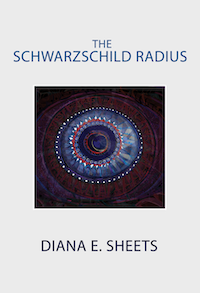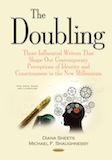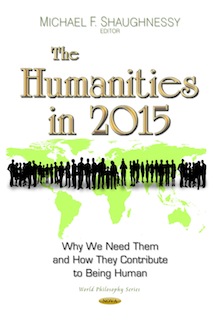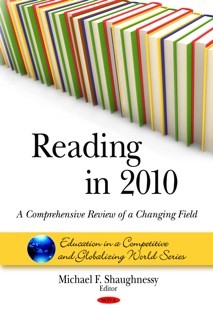Romanticism, Existentialism, and the Postmodern Cult of Self
Copyright © 2011 by Diana E. Sheets
How did the embrace of self-consciousness at the expense of social realism by Romanticism, existentialism, and postmodernism result in the failure of the contemporary novel to convey anything meaningful about our world? Camille Paglia has made a convincing case that the modern era began in the late eighteenth century when Romanticism severed sexual desire from reproductive needs and societal norms (Sexual Personae: Art and Decadence from Nefertiti to Emily Dickinson, Vintage Books, 1991, 475). Romanticism fostered a brooding preoccupation with self. Sex became an agonizing torment, a daemonic affliction that knew no cure. Obsessive desire bred decadence and hedonism that undermined conventional gender identities that gave rise to hermaphroditic longing absent consummation or fertility.
There is nothing lovelier, as there is nothing more famous, in later Hellenic art, than the statue of Hermaphroditus. . . . Perfection once attained on all sides is a thing thenceforward barren of use or fruit; whereas the divided beauty of separate woman and man—a thing inferior and imperfect—can serve all turns of life. Ideal beauty, like ideal genius, dwells apart, as though by compulsion; supremacy is solitude. (Sexual Personae, citing Swinburne, 479)
Indeed, Paglia makes the argument that Romanticism impairs masculinity. Men weaken; they become effeminate or transgendered or sadomasochistic, anything but what we associate with “normative” heterosexual yearning that culminates in marriage and family (453-58). If Swinburne’s poetry exemplifies for Paglia the decadence of late Romanticism, Walter Pater’s criticism embodies stylized aestheticism with perception as the consummate art form (479-81). Thus, aestheticism shifts the focus from the writer as active creator to that of passive observer. The prowess of the aesthete is conveyed through obsessive dedication to the sublime as manifest in the beauty of objects and their exquisite form rather than the pursuit of transgressive desire. Pater, as Paglia notes, “urges refinement of consciousness, not masculine achievement in a materialistic imperialist culture” (482). Decadence shifts from Swinburne’s epistemological pursuit of sexual deviance to Pater’s susceptibility to artistic form and beauty, the later of which is a manifestation of Romantic solipsism (475, 480-3). These developments paved the way for the literary novel of consciousness exemplified by Proust and Joyce that is feminized (a novel of perception, rather than action), narcissistic (the endless focus on the journey of self as conveyed through stream of consciousness), and unmoored from the material world (a devaluation of realism and plot-driven stories).
Romanticism was a reaction not only against the values of the Enlightenment with its embrace of social and scientific rationalism but also the burgeoning Industrial Revolution. As a rejection of modernity, Romanticism exerted a decisive influence on existentialism, the outcome of which proved disastrous to late-twentieth century literary fiction.
Existentialism is generally defined as the subjective human experience of living in a hostile or indifferent universe while assuming freedom and responsibility for one’s moral actions. This definition, however, is problematic since “responsibility” is interpreted narrowly by existentialists as an exercise of free will rather than an assumption of ethical principles called for in a functional civil society.
The foundations of twentieth-century existentialism, which came into prominence in
Existentialism rejected Enlightenment rationalism in favor of an individual’s effort to find meaning in the face of a nihilistic universe. Fyodor Dostoyevsky’s Notes from Underground (1864) anticipates the twentieth-century existential novel in its solipsistic portrayal of a bitter, spiteful man’s perceptions about the cruel and pointless nature of existence.
Jean-Paul Sartre, French philosopher and novelist, became the most celebrated proponent of twentieth-century existentialism. His early fiction Nausea (1938) and the story collection The Wall (1939), as well as his plays The Flies (1943) and No Exit (1944), are examples of literary existentialism. In 1943 he published his philosophical treatise on existentialism Being and Nothingness, which was indebted to and a reaction against Heidegger’s Being and Time. Sartre’s Critique of Dialectical Reason (1960) endeavored to demonstrate the fundamental ties between existentialism and Marxism. But as Raymond Aron suggested, Sartre never fully reconciled his existential philosophy with the economic tenets of Marxism, the latter of which remained peripheral to his philosophic inquiry (In Defense of Decadent Europe, Transaction Publishers, 1996, 55-6).
The problématique of post-War War II existentialism lies with its social, political, and cultural origins. Its foundations are embedded in late nineteenth and early twentieth century German philosophy—as exemplified in the ideas espoused by Nietzsche and Heidegger—that laid the psychological firmament for Nazi thought. In the aftermath of
Nevertheless, this shift of philosophical influence fails to take into account the psychological ramifications of
In Sartre’s case, after having been held at a German prisoner-of-war camp and then subsequently released in 1941, he obtained a teaching post at
After obtaining his teaching position, Sartre helped form Socialisme et liberté. He briefly considered joining the resistance in 1941, but lost interest after learning that neither André Gide nor André Malraux would join the cause at that time. Socialisme et liberté was subsequently dissolved (“Résistance Intellectuelle,” 153-4). In 1943 Sartre published Being and Nothingness, which, as noted earlier, was greatly influenced by Heidegger’s Being and Time. In the early thirties Sartre had traveled to
These philosophical ties between Heidegger and Sartre are significant. For not only did existentialism, as expounded by its preeminent explicator Jean-Paul Sartre, become the prevailing philosophical credo of European intellectuals in the immediate aftermath of the Second World War, French neo-Marxist thought as manifest in structuralism and post-structuralism dominated Western academic institutions and its left-leaning intellectual thinkers for the remainder of the twentieth century.
Yet the prevalence of French intellectual thought in the latter half of the twentieth century belied its foundational influences. French existentialism, a response to decadent late-Romanticism and the philosophic perspectives of Nietzsche and Heidegger, gave homage to
The exhortation to moral freedom espoused by Being and Nothingness was illusionary, conceived by Sartre in captivity (prison and German occupation) while entrenched in the bowels of defeat. Its premise is that existence (Being-in-itself) occurs prior to essence (Being-for-itself, namely, the conscious choices one makes in living one’s life). Sartre’s 1944 essay “The Republic of Silence” elaborated, “We were never more free than during the German occupation. . . . And the choice that each of us made of his life and of his being was an authentic choice because it was made face to face with death. . . . ” (A.J. Liebling, The Republic of Silence, Harcourt, Brace and Company, 1947, 498).
Yet this “liberty” achieved during German occupation led in Sartre’s case not to freedom but co-option. Surviving in the face of an enemy occupier meant accommodation, not resistance. Freedom might have been realized by Sartre if he had risked his life by joining the Résistance to fight the German military and the collaborationist Vichy Regime, but he did not. Neither in his relationships with Jews nor in his personal life did he actively oppose German occupation (“Sartre and the Jews,” 96-101).
As Wroblewsky noted, Sartre’s War Diaries contain “a mixture of unreflected anti-Semitic prejudice and clichés, as well as paternalistic sympathy and irritated disdain” (Vincent von Wroblewsky, “The Early Sartre and the Jewish Question,” Sartre Studies International, Vol. 3, No. 2, Winter 1997, 22) and these stereotypes are also evident in Sartre’s literary works (“Sartre and the Jews,” 96).
Amidst war and collaboration he advanced his literary and philosophical reputation by writing Being and Nothingness, a work that aided his association with Heidegger and, by extension,
Here some of the biographical events in Sartre’s life necessitate repeating since, more than any other European philosopher in the immediate aftermath of World War II, his views became synonymous with existentialism and tenets of neo-Marxism in the West. During the 1930s Sartre traveled to
Being and Nothingness was a sustained dialogue with Heidegger’s Being in Time. Published in 1943, it has been wrongly interpreted as a celebration of freedom amidst captivity. Had
Here for the first time I encountered an independent thinker who, from the foundations up, has experienced the area out of which I think. Your work shows such an immediate comprehension of my philosophy as I have never before encountered (Rüdiger Safranski, Martin Heidegger: Between Good and Evil, Translated by Ewald Osers, Harvard University Press, 1998, 349).
A year later, after reading Sartre’s essay “Existentialism is a Humanism” (1946) and witnessing his meteoric rise as one of
By the 1960s structuralism had replaced existentialism as the dominant philosophic belief system of the French left. Structuralism borrowed from the structural linguistics of Ferdinand de Saussure and the anthropological ideas of Claude Lévi-Strauss to “decode” the hidden structures of society. The limitations of humanism posited by Heidegger prompted Louis Althusser to embrace “antihumanism” in generational opposition to Sartre and the other (French) Marxist humanists, shifting the focus for revolution away from consciousness and human agency toward an analysis of the economic structure and the political and ideological superstructure (For Marx, Translated by Ben Brewster, Verso, 1979, 11-13, 200-1, 2009-13, 2015, 2017, 255-6).
Indeed, the Marxist-Leninist perspectives of the French structuralists in the 1960s suggested that French collaboration had shifted from one authoritarian Europower (Nazi Germany) to a global superpower (the
In the aftermath of the 1968
The post-structuralist approaches as advanced by Roland Barthes and Jacques Derrida destabilized literature, divested it of all intrinsic meaning and value. The focus shifted from interpreting the truth and substance of a literary work and the intentions of its author to a celebration of the self-appointed critic or reader who was now free to interpret the “text” as he or she chose. In the
By the late 1980s and early 1990s the damage in academic institutions was complete. Post-structuralist and postmodern literary “Theory” had become fully embedded in the humanistic disciplines of American universities. No longer did the humanities have a Canon, a core system of intellectual and philosophical beliefs that formed the bases of our understanding of Western Civilization. Intellectual content and a rigorous understanding of the literary, historical, and philosophical foundations of Western thought had been replaced with Theory, a pastiche of arguments that were neither theoretical nor intrinsically literary. Rather, Theory was an amalgam of post-structuralist and postmodern normative beliefs based on social justice—granting the greatest resources to the least privileged regardless of talent or capability—and identity politics—the dissolution of all shared cultural referents in favor of a multitude of fractious grievances based on disparate cultural identities with the emphasis on those ethnic groups deemed to be the most socially or economically disadvantaged (Diana E. Sheets, “Academe, Theory, and our Cultural Demise,” http://www.literarygulag.com/blog/show/18).
Postmodern relativism, coming as it did on the flanks of countercultural rebellion, ensured that there would be no historical appreciation of the foundations of Western thought. By the late 1980s and early 1990s, popular culture and celebrity fused with political correctness to ensure that the normative values embraced the narcissistic self in pursuit of immediate gratification based on a subjective and relativistic sense of social justice absent all standards of cultural excellence (Sheets, “The Great Books and Cultural Identity: The Rise and Fall of Western Memory and Its Implications for Our Time,” Reading in 2010: A Comprehensive Review of a Changing Field, Nova Science Publishers, Inc., 2010, 163-71, https://www.novapublishers.com/catalog/product_info.php?products_id=14560).
These trends were to have deadly consequences for literature. The subjective, interior novel of consciousness, foreshadowed by Dostoyevsky’s Notes from Underground and embodied in the decadent late-Romantic cult of self evident in the poetry of Swinburne and the asceticism of Pater, would be celebrated at the expense of the materialistic novel engaged with the world. Literary fiction’s homage to interiority and existential angst would become manifestly evident in the celebration of the fiction of Proust, Kafka, and Joyce. Realistic fiction deflated the interiorized cult of self because of the need to have its characters engaged with the world. Consequently, literary realism challenges the post-structuralist methods of deconstruction as attacks on perception and reality exemplified most notably in the writings of Barthes and Derrida.
To take the word realism and the idea of representation seriously entails a challenge to the antireferential basis of our criticism and to the method of radical deconstruction that has become a commonplace. It is to challenge the assumptions about the status of literature variously held by Roland Barthes and Jacques Derrida. . . . (George Levine, The Realistic Imagination, The University of Chicago Press, 1981, 3).
The methodological approach of realism, as Levine noted, is “a self-conscious effort, usually in the name of some moral enterprise of truth telling and extending the limits of human sympathy, to make literature appear to be describing directly not some other language but reality itself. . . .” (Levine, 8). Realism rejects obsessive interiority; it rejects existential angst and emotive relativity. It rejects postmodern critics’ assault on the sanctity of the text in an effort to demonstrate truth.
The outcome of post-structuralism and postmodernism relativity would be ceaseless and subjective interiority, a literary journey of the self obsessed with its own narcissistic journey absent any meaningful and truthful representation of the world. Under these circumstances was it any surprise that memoir—a fictional presentation of that very same solipsistic journey masquerading as self-truth or personal redemption—was replacing the novel as the principle representation of literature by the beginning of the twenty-first century?
Having abandoned any objective relationship with truth and reality beginning with Romanticism and its celebration of self-consciousness, this solipsistic journey of decadence drenched in nihilism led to narcissism and cultural relativism. The literary consequence of
The . . . being is . . . a pastless futureless man, born anew at every instant. The instants are points which organize themselves into a line, but what is important is the instant, not the line. The . . . being has in a sense no history. Nothing follows from what has gone before. He is constantly surprised. He cannot predict his own reaction to events. He is constantly being overtaken by events. A condition of breathlessness and dazzlement surrounds him. (Donald Bartheleme, Sixty Stories, Penguin Books, 2003, 77).
As Charles Hill noted, “literature, once paramount as a way of knowing, was evicted from its place in the pantheon of the arts by popular cultures of entertainment sometime in the late mid-twentieth century. . . .” (Grand Strategies: Literature, Statecraft, and World Order,
As Western Civilization limps on to an ignoble conclusion (Jacques Barzun, From Dawn to Decadence: 500 Years of Western Cultural Life, 1500 to the Present, HarperCollins Publishers, 2000, 773-76, 781, 792-4; Niall Ferguson, “Conclusion: The Rivals,” Civilization: The West and the Rest, The Penguin Press, Kindle Edition, 2011, 5300-66, 5382-97, 5460-66, 5483-99,









